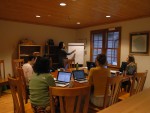The Long-Term Ecological Research (LTER) Network is in the implementation phase of the Integrated Science for Society and Environment (ISSE) initiative, a 10-year plan to promote socio-ecological research. The ISSE recognizes graduate students as the next generation of lead scientists in the LTER Network by stressing the importance of training and supporting trans-disciplinary graduate student research.
During the 2009 LTER All Scientists Meeting, our group of interdisciplinary researchers, including an environmental sociologist (Michele Romolini), and environmental anthropologist (Rebecca Garvoille), a plant ecologist (Sydne Record), a microbial ecologist (Yevgeniy Marusenko) and an information scientist (R. Stuart Geiger), participated in a “benefits and barriers” graduate student working group aimed at characterizing the diverse experiences of graduate students in LTER.
With the help and funding from the LTER Network Office (LNO), we discovered through surveys and interviews that LTER graduate students do, in fact, face different institutional, cultural, and logistical barriers to practicing socio-ecological research within the Network. In a paper set to be published in Ecology & Society, we describe the conceptualization and practice of socio-ecological research from a graduate student perspective and how these examples fit into multiple scales, including the individual or project, LTER site, and network level. Subsequently, at the 2012 LTER All Scientists Meeting Sydne Record and Michele Romolini used supplemental funding by the LNO to continue describing the many thriving socio-ecological research projects within the network involving graduate students and early-career scientists.

 Enlarge this image
Enlarge this image
